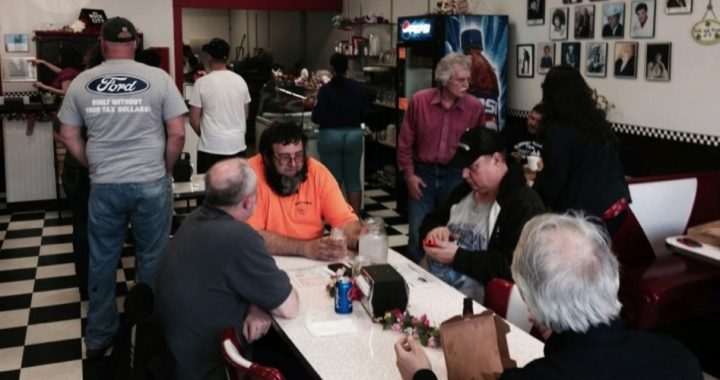
A small family-owned business in Indiana reopened late last week after being closed for eight days due to the uproar over the owners’ statements that they would not cater a same-sex wedding if asked to do so. The backlash reportedly included death threats and a Twitter message inviting people to join in burning the restaurant down.
The furor broke out after a reporter from the ABC TV affiliate in South Bend entered Memories Pizza (shown) in Walkerton and asked one of the owners for her thoughts about the controversy surrounding the Religious Freedom Restoration Act that had been signed into law by Indiana Governor Mike Pence. Opponents condemned the legislation as an invitation for business owners to discriminate against homosexuals. In response to a hypothetical question, Crystal O’Connor said the pizza shop would not provide service specifically to a same-sex wedding, since that would be contrary the owners’ religious convictions about marriage.
“If a gay couple came in and wanted us to provide pizzas for their wedding, we would have to say no,” Crystal O’Connor said. “We’re not discriminating against anyone, that’s just our belief,” she said. “We are a Christian establishment.” Concerning the state’s new Religious Freedom Restoration Act, “We definitely agree with the bill,” she said. Her father, Kevin O’Connor, backed up her remarks.
“That lifestyle is something they choose,” he said. “I choose to be heterosexual. They choose to be homosexual. Why should I be beat over the head to go along with something they choose?” The O’Connors said they would not deny service to people who came into the restaurant based on their sexual orientation, but would draw the line at providing service for a same-sex wedding ceremony.
That set off what the Indianapolis Star described as a storm of “Internet fury” that brought national attention to the small town of 2,200, about 20 miles southwest of South Bend. The O’Connors were denounced far and wide for their “anti-gay” remarks. Police asked the St. Joseph County prosecutor to investigate the Twitter posting that said, “Who’s going to Walkerton with me to burn down Memories Pizza.” The woman believed to be the author of that posting is a coach at Elkhart County High School and has since been suspended, the South Bend Tribune reported.
Walkerton Police issued a statement calling on citizens to keep the controversy within the limits of the law, as patrols around the restaurant were increased. “The Walkerton Police Department is committed to extending professional police services to all in need, regardless of said person’s sexual, religious or political views,” the bulletin said. “We ask that all frustrations and rebuttals with Memories Pizza’s recent media statements remain within the law.” Some of the local residents were surprised by the controversy and its intensity.
“I’ve been here a long time, and this is something different,” a town dispatcher told the Star.
As the furor drew national attention, the New York-based Catholic League for Religious and Civil Rights released a statement in support of the O”Connors, saying, “The owners of Memories Pizza deserve our support, but even those who disagree with them deserve to treat them with respect.” Crystal O’Connor at one point said her family was even thinking of abandoning the business and leaving Indiana. “I don’t know if we will reopen or if we can,” she told The Blaze, a conservative website and TV outlet.
But when the restaurant reopened last Thursday, customers quickly filled all eight tables, along with a line of people waiting for takeout orders. In the meantime, supporters around the country had contributed to a fundraising effort for Memories Pizza on the GoFundMe website. The effort to help the business recoup the losses from the shutdown raised more than $842,000 with donations from 29,160 contributors, the Associated Press reported. Crystal O’Connor said the support for the small pizza shop was overwhelming. “We were like, ‘Stop! Stop! Stop!'” she said.
Kevin O’Connor told AP he hadn’t received the money yet, but he planned to give some of it to charity and use some to make improvements at the restaurant. The 61-year-old father of eight said he has no plans to take the money and retire. “I enjoy it,” he said of the business. “I don’t want to leave here. I want this to be something that my daughter can enjoy.”
The Indiana law that caused so much controversy was enacted in late March. It says the state government may not “substantially burden a person’s exercise of religion” and a person who believes his religious beliefs are being substantially burdened may use the law as a defense against a lawsuit. Those who saw the potential for businesses to deny service on religious grounds to same-sex weddings or other events quickly organized a national protest against the act, which is based on the federal Religious Freedom Restoration Act passed by Congress and signed into law by President Bill Clinton in 1993. Major businesses and convention organizers joined the protest, with some threatening to boycott the state. The National Collegiate Athletic Association, which has its headquarters in Indianapolis and held this year’s Final Four basketball tournament there, said the new law could force it to consider leaving Indiana out of plans for future events.
The mayors of San Francisco and Seattle issued statements announcing bans on the spending of public funds for travel to Indiana. Seattle would also inspect city contracts to see if any are with businesses located in Indiana. Connecticut Governor Dannel Malloy left himself open to charges of hypocrisy when he issued an executive order banning the use of state funds for travel by state employees to Indiana, calling the Hoosier law “disturbing, disgraceful and outright discriminatory.” Connecticut is one of 21 states that have a religious freedom law similar to Indiana’s, though Malloy said the Connecticut law does not permit discrimination.
The furor abated when Indiana lawmakers yielded to the pressure and on April 2 passed an amendment to the law that explicitly prohibits businesses from denying service to gay or lesbian patrons. Churches and church-affiliated schools are exempt. Governor Pence quickly signed the law, though he had previously said he was not in favor of such a provision.
“I will not push for that,” Pence said in a March 29 appearance on ABC’s This Week when asked if he would advocate amending the state’s civil rights law to ban discrimination based on sexual orientation. “That’s a — that’s not on my agenda and that’s not been the — that’s not been an objective of the people of the state of Indiana.”
But by caving in to the political and economic pressure, Governor Pence and the Republican legislature of Indiana have effectively made mincemeat of the religious liberty they had set out to protect. They have expanded the concept of civil rights to include the right to have pizza at a same-sex wedding party provided by people who regard such weddings as an abomination in the eyes of God. Even the most imaginative of lawyers might have trouble finding that in the nation’s Bill of Rights.
In Indiana, as in the rest of the nation, guarantees of religious liberty and the rights of conscience are written in disappearing ink.
Photo of dining area in Memories Pizza: AP Images



